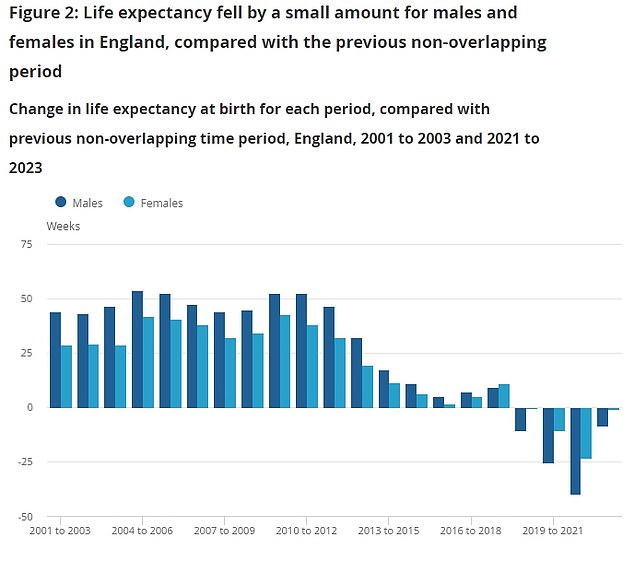Men’s life expectancy has dropped by half a year while women’s has fallen by three months since the Covid pandemic, new official figures show.
Children born in England and Wales are expected live to 79 years, while women will reach 83 on average, the Office for National Statistics (ONS) today revealed.
That’s 26 weeks lower for men and 13 weeks lower for a woman that before the pandemic, according to the data.
Despite life expectancy increasing over the past 40 years, due to advances in healthcare, living and working conditions, since 2011, it had started to plateau.
While experts blamed the recent drop primarily on Covid, they also pointed the finger at soaring rates of heart disease, cancer and diabetes.
More than two years ago the Conservatives, then in government, pledged to increase health life expectancy by five years by 2035.
However, latest data suggests England and Wales may be some way off achieving this target.
There has been some recovery since the pandemic — the latest figures represent a 13 week increase for men, and an 11 week increase in life expectancy for women.
But ONS data specialists suggested a general decline in quality of life could be another reason the figure still remains low.
In recent years, Britain has faced a cost of living crisis, which experts warned increased the risk of malnourishment due to high food and energy prices.
These ONS figures, the latest available, cover average life expectancy meaning some people will live less and others far longer.

Since 2011 life expectancy has started to plateau with experts also blaming increased death rates on the Covid pandemic, as well as soaring rates of heart disease, cancer and diabetes (Source: ONS)
Previously charities have warned that while life expectancy figures had recovered slightly since the sharp fall in 2020, the bounce back in the aftermath of the pandemic had not been as strong as anticipated.
They pointed to the prevalence in conditions including heart disease and diabetes that helped to stall further rises in life expectancy.
Referring to ONS figures released in January 2024, Veena Raleigh, senior fellow at The King’s Fund, said: ‘Although life expectancy has recovered somewhat since the sharp fall in 2020 when the pandemic struck, it’s not had the bounce back that might have been expected.
‘It points to deeper problems with the health of the nation and the resilience of the health care system.
‘Much of the heavy burden of sickness and death in the UK is caused by preventable conditions, such as heart disease, stroke, lung cancer, and diabetes.’
How long you are expected to live also depend where you live in the UK.
There is about a year difference in life expectancy between England and Wales, with data showing life expectancy at birth in 2021 to 2023 to be 79.1 years for males and 83 years for females in England and 78.1 years for males and 82 years for females in Wales.

Those aged 65 years were estimated to live a further 18.6 years for men and 21.1 years for women in 2021 to 2023 in England and Wales
It has previously been highlighted that a boy born in Hart, Hampshire, between 2020 and 2022 can expect to reach his 83rd birthday — the highest recorded.
Meanwhile, a boy born in Blackpool will likely only live to 73, a gap of more than a decade.
Disparities have also been seen for girls, one born in Kensington and Chelsea between 2020 and 2022 should get to 86 (86.34), two years less than a woman aged 65 in the area at the same time.
Meanwhile girls born in Blaenau Gwent in the same period will likely only live until 78, a gap of 7.5 years compared to their peers in London.
The ONS estimates are based on a figure called period life expectancy.
This is a hypothetical measure that assumes the mortality rates recorded in an area between 2020 to 2022 applies throughout a person’s life. If mortality rates improve during a person’s life, period life expectancy will go back up.
Life expectancy at 65 years also remains below pre-pandemic levels of 18.8 years for men and 21.2 years for women in 2017 to 2019.
For those aged 90, life expectancy was 3.9 years for men and 4.6 years for women in 2021 to 2023.
Improvements in life expectancy at 90 years have been low for several years.
But, previous improvements in mortality over many decades and a historical peak in the number of births notably around 1920 to 1921 have resulted in more people reaching the very oldest ages in recent years, ONS explains.
This article was originally published by a www.dailymail.co.uk . Read the Original article here. .


